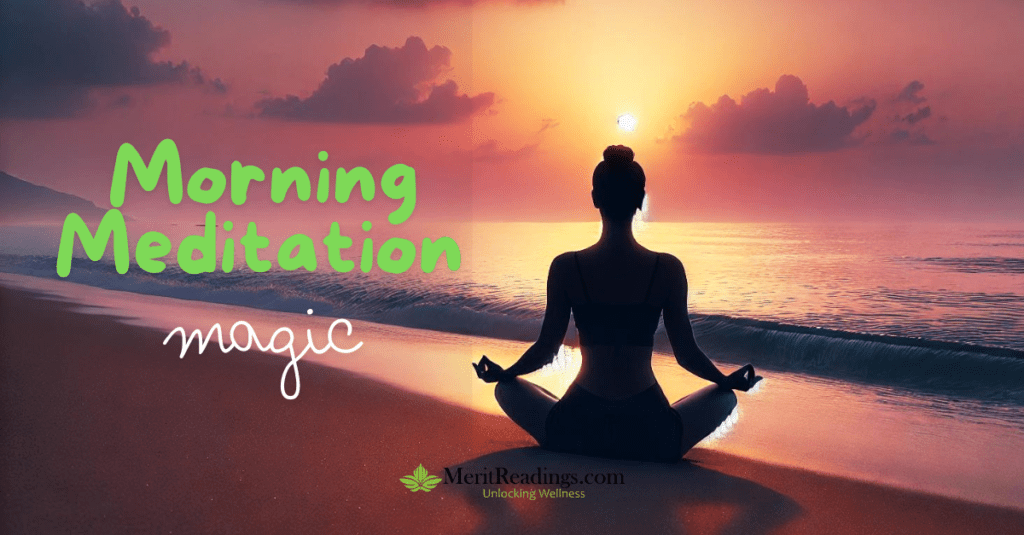Have you ever wondered if there’s an easy way to find more peace and happiness in your life? Many people think meditation is just about sitting quietly, but it’s so much more. It’s a powerful practice that can bring great benefits to your mind and spirit.
Meditation isn’t just a short break from your day; it’s a way to connect with yourself and feel better inside. By practising meditation regularly, you can find more calm and joy, which can make a big difference in how you feel daily.
Discover how meditation can help you feel more balanced, peaceful, and happy.
What is Spiritual Meditation?
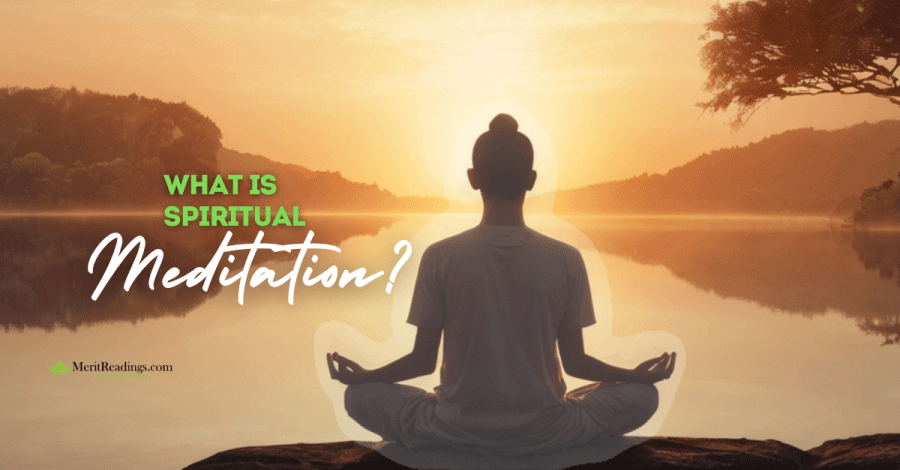
Spiritual meditation is about going deep within yourself. It involves stripping away perceptions and experiencing pure joy, peace, love, and light. This form of meditation helps you realize eternal truths and be present in the moment, finding solace in the here and now. It is a journey towards understanding your true nature and developing a deeper understanding of life.
Benefits of Spiritual Meditation
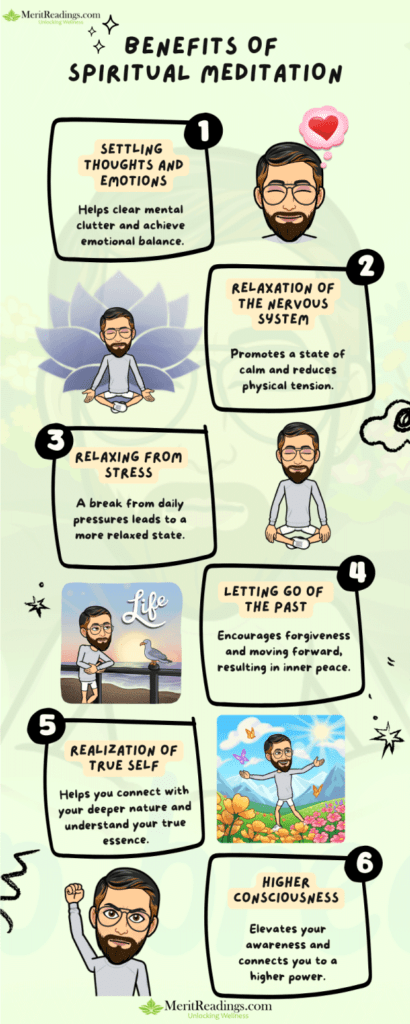
Spiritual meditation offers a wealth of benefits, impacting both mental and physical health. Here’s a comprehensive look at how this practice enhances overall well-being:
Mental and Emotional Well-Being
- Releasing and Settling Thoughts and Emotions: Meditation helps clear mental clutter and achieve emotional balance, which can reduce stress and improve overall emotional health (Art of Living, 2024).
- Relaxation of the Nervous System: Regular practice calms the nervous system, alleviating physical tension and stress (Healthline, 2024).
- Emotional Regulation: By managing emotions more effectively, meditation promotes a balanced emotional state (SOS, 2024).
- Improved Sleep Quality: Meditation can contribute to deeper and more restful sleep, which enhances overall well-being (Aura Health, 2024).
- Impact on Blood Pressure: Regular meditation is known to help lower blood pressure, supporting better heart health (UH Wellness, 2024).
- Enhanced Immune Function: Meditation strengthens the immune system, helping the body fight off illnesses (EOC Institute, 2024).
Personal Growth and Inner Peace
- Letting Go of the Past: Meditation encourages forgiveness and moving forward, resulting in a greater sense of inner peace (My Solluna, 2024).
- Realization of True Self: It helps connect with your deeper nature and understand your true essence (The Wonders, 2024).
- Empowerment and Higher Consciousness: Meditation elevates awareness and connects you to a higher sense of purpose (Art of Living, 2024).
People also read: Incredible Benefits of Morning Meditation Revealed
Spiritual Benefits of Meditation
In addition to the mental and emotional benefits, spiritual meditation profoundly enhances your spiritual life. Here are some of the key spiritual benefits:
Inner Peace and Harmony
- Balanced Sense of Being: Meditation helps you find balance in life, fostering a sense of stability and harmony.
- Inner Stillness, Peace, and Contentment: Leads to deep inner calm, resulting in lasting peace and happiness.
- Radiating Smile, Love, Calmness, and Serenity: Regular practice allows you to emanate positivity and tranquility.
Spiritual Awakening and Awareness
- Heightened Spiritual Awakening and Freedom: Meditation awakens your spirit, providing a sense of liberation and enlightenment.
- Increased Awareness and Mindfulness: Enhances your ability to live in the present moment with full awareness.
- Living in the Present Moment: Encourages appreciation of the now, reducing worries about the past and future.
Self-Realization and Authenticity
- Inner Bliss Independent of Outer Circumstances: You find joy and contentment from within, unaffected by external events.
- Genuine Sense of Self: Meditation helps you discover and embrace your true nature.
- Ease and Natural Presence: Fosters a sense of ease and authenticity in your daily life.
Connection and Compassion
- Sense of Belonging and Connection: Meditation nurtures feelings of connectedness and community.
- Nurturing Relationships: Enhances your ability to form and maintain healthy, loving relationships.
- Compassion, Kindness, and Forgiveness: Cultivates a compassionate and forgiving heart.
Personal Empowerment and Growth
- Feelings of Abundance and Security: Promotes a mindset of abundance and safety.
- Increased Creativity and Out-of-the-Box Thinking: Boosts creativity and innovative thinking.
- Resilience and Stress Management: Strengthens your resilience, helping handle stress more effectively.
- Increased Acceptance: Teaches you to accept yourself and others, fostering a non-judgmental attitude.
- Glimpse of Infinity: Experience moments of boundless freedom and infinite possibilities through meditation.
Getting Started with Spiritual Meditation
- Find a Quiet Space: Choose a peaceful spot where you won’t be disturbed.
- Get Comfortable: Sit with a straight back or lie down, ensuring you’re relaxed but alert.
- Focus on Your Breath: Close your eyes and breathe deeply, concentrating on the rhythm of your breath.
- Use a Mantra: Silently repeat a word or phrase, like “Peace” or “Om,” to help maintain focus.
- Start Small: Begin with 5-10 minutes daily, gradually increasing as you become more comfortable.
- Explore Guided Meditations: Use apps or videos to help you get started.
- Be Patient: Meditation takes time—practice regularly and be kind to yourself.
People also search: How to Start a Meditation Routine
Understanding Mantras in Spiritual Meditation
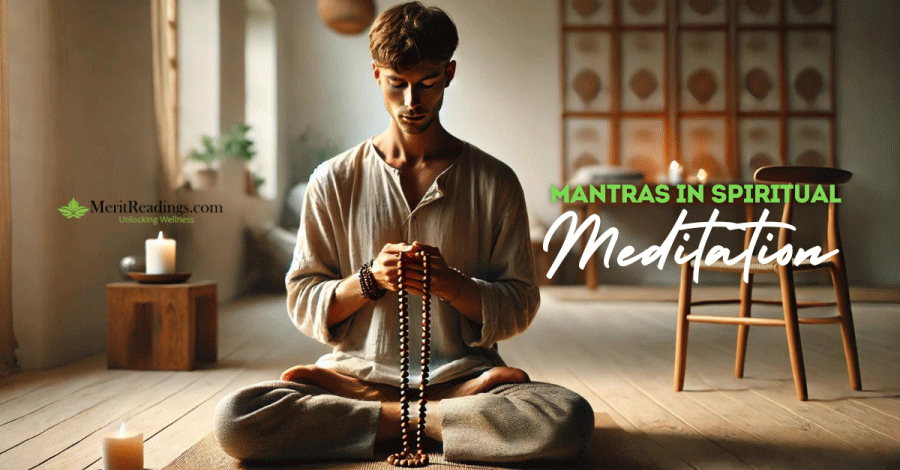
A mantra is a powerful tool in spiritual meditation. The term “mantra” means “that which saves the mind” (Mana + Trayate). Mantras have deep spiritual significance. They symbolize the non-duality of God’s name and God Himself. Repeating a mantra helps you focus and connect with a higher power, guiding you towards spiritual awakening.
Benefits of Meditation with Mantras
Using mantras in meditation enhances concentration abilities. It brings overall mental calm and well-being. The scientific basis and universality of mantras are well-documented, showing their effectiveness in meditation practices across different cultures and traditions.
- Enhancing Concentration Abilities: Mantras help focus the mind, improving concentration.
- Overall Mental Calm and Well-being: Promotes inner peace and emotional balance.
- Scientific Basis and Universality: Mantras are supported by research and used globally in various traditions.
Commonly Used Mantras for Spiritual Meditation
➔ Om (Aum): The sound of the universe, symbolizing the essence of creation and unity. It helps connect with higher consciousness and brings a deep sense of peace.
➔ So Hum: Meaning “I am that,” this mantra reinforces the connection between the individual and the universe, fostering a sense of oneness.
➔ Om Shanti Shanti Shanti: This mantra invokes peace in body, mind, and spirit. It’s a calming chant to promote inner stillness and harmony.
➔ Lokah Samastah Sukhino Bhavantu: Meaning “May all beings everywhere be happy and free,” it cultivates compassion, love, and a sense of connectedness.
➔ Om Namah Shivaya: This powerful mantra translates to “I bow to Shiva,” representing transformation and destruction of the ego. It invites personal growth and self-awareness.➔ Om Mani Padme Hum: A famous Tibetan Buddhist mantra meaning “The jewel is in the lotus.” It’s used to invoke compassion, wisdom, and enlightenment.
Transformational Experiences
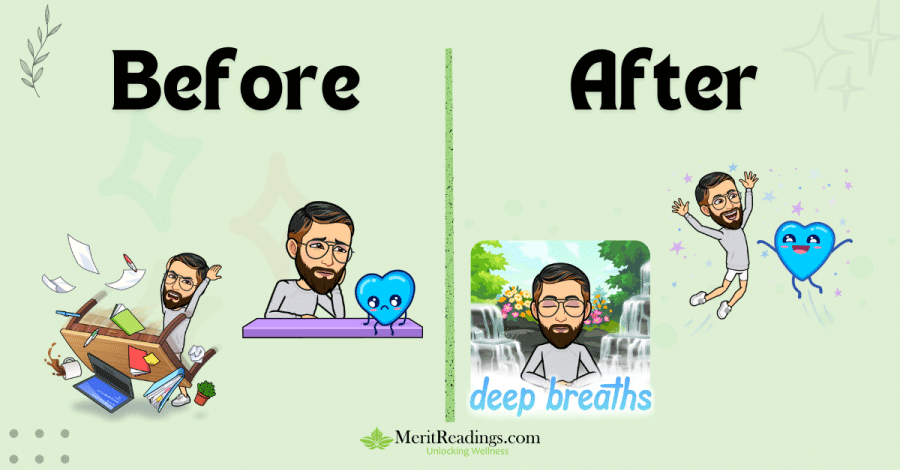
Personal journeys and transformations through meditation are truly amazing. Imagine hearing real-life stories about how meditation has profoundly changed people’s lives. Seeing how it leads to spiritual growth and a deeper sense of fulfilment is inspiring. These stories show just how powerful meditation can be in transforming lives.
Sarah’s Experience:
Sarah struggled with anxiety for years. After starting meditation, she noticed a significant reduction in her stress levels and felt a newfound sense of inner peace. Meditation became her tool for managing anxiety and deepening her self-awareness.
John’s Experience:
John, a busy executive, was overwhelmed by stress and health issues. Through daily meditation, he found relief from high blood pressure and insomnia. More importantly, it transformed his outlook on life, making him more patient and mindful.
Maria’s Experience:
Maria, a young mother coping with grief, turned to meditation to find emotional strength. It helped her process her loss, regain joy in daily life, and discover resilience within herself. Meditation became her source of inner peace and gratitude.
Conclusion
Meditation is a simple but powerful practice that can make a big difference in your life. It helps you find inner peace, connect with your true self, and thoroughly enjoy the present moment. Making meditation a regular part of your routine makes you feel calmer, happier, and more balanced.
It’s not just about finding a quiet spot to sit; it’s about discovering a new way to experience life. As you continue to practice, you’ll notice positive changes in how you handle stress and how you feel about yourself and the world around you.
If you’re curious about meditation, why not give it a try? Start with a simple technique and see what feels right for you. Remember, everyone’s experience is different, so find what works best for you. Keep practicing and let meditation help you feel better and live a happier life.
FAQs
Q: How does meditation benefit you spiritually?
A: Meditation enables you to connect with your true self, bringing peace, joy, and fulfillment. It deepens your awareness and mindfulness, helps release stress, and provides inner calm. It also opens paths to spiritual growth and higher consciousness.
Q: What are the amazing benefits of meditation?
A: Meditation reduces stress and anxiety, improves concentration and mental clarity, boosts emotional well-being, helps you sleep better, and promotes relaxation. It also enhances self-awareness and fosters a positive outlook on life.
Q: Why is meditation so powerful?
A: Meditation quiets the mind and soothes the nervous system, helping you focus on the present moment. Regular practice leads to lasting inner peace and connects you to a higher power and deeper truths, transforming your body, mind, and soul in profound ways.
Q: Can meditation help with physical health?
A: Yes, meditation can improve physical health. It helps lower blood pressure, enhances the immune system, manages pain, improves sleep quality, promotes relaxation, and reduces the risk of heart disease.
Q: What is the difference between mindfulness and meditation?
A: Mindfulness is being present and fully engaged in the moment, while meditation is a practice that helps develop mindfulness. Both aim to increase awareness and reduce stress. They complement each other and can be practiced together.
Q: How long should I meditate each day?
A: Start with just a few minutes a day and gradually increase the time as you get more comfortable. Aim for 10-20 minutes daily. The key is consistency, so find a routine that works for you.
Q: Can children benefit from meditation?
A: Absolutely. Children can benefit from meditation by managing stress and emotions, improving focus and concentration, and enhancing sleep and overall well-being. Simple guided meditation exercises are great for kids.


